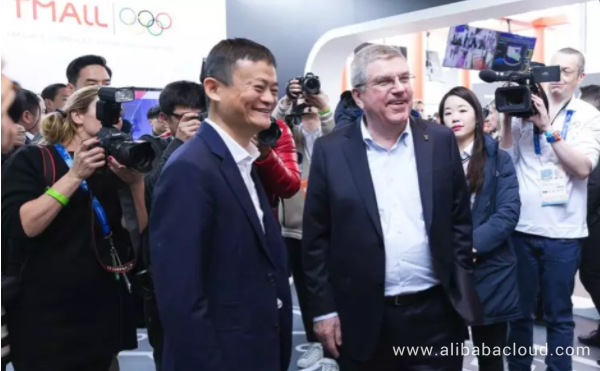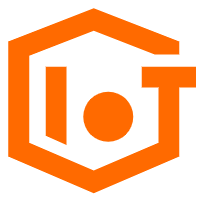On February 9, 2018, the 23rd Winter Olympic Games commenced in Pyeongchang, South Korea. This event marked a new milestone for Alibaba as well as for the International Olympic Committee (IOC) in the 122 years of Olympics history by introducing cloud computing and artificial technologies to the games.
In the Alibaba Winter Olympics exhibition hall located in Gangneung Olympic Park, IOC Chairman Bach and Alibaba's executive chairman Jack Ma jointly announced a new start of the Olympics on February 10. During the event, Alibaba introduced the "Cloud Olympics" concept and launched Alibaba Cloud ET Olympic Brain globally.

On that day, Bach handed the Olympic Torch to Jack Ma as a gift and said,
"The Olympic Torch is symbolic of the Olympic values and has gone over a history of more than 3000 years since the start of Olympics Games in ancient Greece. Today I transfer the torch to Alibaba. Let's look into the future of Olympics together."
Jack Ma added,
"We founded Alibaba with a dream to enable ordinary people with technologies. Now we still keep this dream — use our strengths to help every individual. Our cooperation with IOC enables us to take an active part in Olympics. We must bring Olympics to a new digital age and serve the games better with technologies so that people can compete and seize opportunities in a more fair way."
Let's now look at how Alibaba Cloud is working with the IOC to revolutionize the Olympic Games using artificial intelligence (AI), big data, and Internet of Things (IoT) technologies.
Alibaba Cloud ET Olympic Brain is an artificial intelligence system designed for significant sporting events such as the Olympic Games. Behind the ET Olympic Brain, Alibaba Cloud uses the Apsara operating system to connect millions of servers around the world into a computing resource network, which provides computing capability to support organization of the Olympic Games. This network makes the operation of the Olympic Games more cost effective and efficient.
By leveraging its powerful computing capability, Alibaba promote the evolution of Olympic Games from these four aspects:
The Internet creates better experiences of Olympics, and enables millions of youngsters to join in the event, hence rejuvenating the Olympics. In the past, people outside of the arenas can only catch the Games on TV. Now, more people, especially youngsters, choose to watch the Games on mobile phones or mobile terminals in their cars. Additionally, Alibaba Cloud ET Olympic Brain has a content recommendation engine to deliver personalized content and apps to online users. Users can also use VR or AR devices to enjoy an immersive experience of the games and interact with the athletes they like.
New technologies, such as artificial intelligence, IoT, and big data, improve the operation efficiency of host cities and enable these cities to achieve a successful Olympics with fewer resources. In the 2016 Summer Olympics in Rio, over 15,000 athletes, 3000 media, 200,000 volunteers, and millions of spectators attended the event. The vast crowd brings massive pressure to local infrastructure and is difficult to handle using traditional management model and technologies.
Alibaba Cloud helped the 2018 Pyeongchang Winter Olympic Games avoid these problems by "digitizing" all processes involved during the event. By "digitizing" people, things, events, buildings, and facilities associated with Olympic Games, the organizers could analyze data in real-time and schedule resources automatically by using AI and big data technologies. For example, Alibaba Cloud helped organizers to predict traffic congestion spots and dynamically adjust traffic lights to improve transit efficiency. Remote control of traffic lights ensures that ambulances can arrive within the shortest time as possible in case of accidents. Furthermore, crowd analysis and prediction functions can trigger public security alerts to prevent severe incidents such as stampedes.
Alibaba Cloud ET Olympic Brain also helps athletes to increase their performance. ET Olympic Brain employs video recognition and IoT technologies to capture movements of athletes and produce detailed data. This helps athlete to monitor and improve the efficiency of their training and fine tune their techniques. Alibaba Cloud also offers a digital health "e-record" management service to synchronize healthcare data of athletes between their home countries and Olympics host cities. This helps athletes to manage their injuries better and speed up the recovery process.
With all these technologies, athletes and coaches can optimize training methods while minimizing injuries, helping them become "higher, faster, and stronger."
As one of the largest sporting events in the world, it is no surprise that the Olympic Games witnesses massive spikes in traffic from viewers across the globe.
Alibaba Cloud's global footprint ensure billions to tune-in at any time and from anywhere, without the inconvenience of latency or poor video quality. This digital integration help provide a seamlessly integrated viewing experience of the Olympic Games, regardless on social media, on cable TV, or on the move. Alibaba Cloud, together with Youku, enable billions of audience around the globe to enjoy exciting games anytime, anywhere.
In January 2017, Alibaba and the IOC reached an agreement on long-term cooperation effective until 2028. Since then, Alibaba became the exclusive partner in the cloud service and e-commerce platform service fields. Alibaba also became a founding partner of the Olympic Channel.
The IOC has two goals in the long run, increased participation of the younger generation and improvement of Olympics organization efficiency. In as early as 2013, Chairman Bach suggested the use of digital and cloud technologies to reduce repetitive construction cost of the 2020 Olympic Games. Furthermore, in the agenda for the 2020 Olympics, IOC takes the participation of global young people as a core element of the 2020 Olympic Games.
The IOC is looking forward to collaborating with Alibaba to start the digital revolution for Olympics.
"We are glad to make the decision on a partnership with Alibaba and believe that Alibaba can bring Olympics into the digital age," said Bach.
Over the course of 100 years, every technological evolution introduced to the Olympic Games has significantly improved its impact and performance. In the 1924 Olympics in Paris, radio became a new channel in addition to print media for people to learn about Olympics. In the 1948 Olympics in London, television delivered live images of Olympics to households. The 1996 Olympics in Atlanta was the first Olympics to use the internet to broadcast the Games. And finally in the 2018 Pyeongchang Winter Olympics, Alibaba helped the IOC to achieve a digital revolution of the Olympic Games.
To read more on IoT and AI, visit www.alibabacloud.com/blog.
DevSecOps Best Practices on Alibaba Cloud – Building an E-Commerce Application

2,593 posts | 776 followers
FollowAlibaba Cloud Community - March 24, 2022
Alibaba Cloud Community - October 30, 2023
Alibaba Cloud Community - February 22, 2022
Alibaba Cloud Community - March 18, 2022
Alibaba Cloud Community - January 18, 2024
Alibaba Cloud Community - March 2, 2022

2,593 posts | 776 followers
Follow IoT Platform
IoT Platform
Provides secure and reliable communication between devices and the IoT Platform which allows you to manage a large number of devices on a single IoT Platform.
Learn More Global Internet Access Solution
Global Internet Access Solution
Migrate your Internet Data Center’s (IDC) Internet gateway to the cloud securely through Alibaba Cloud’s high-quality Internet bandwidth and premium Mainland China route.
Learn More IoT Solution
IoT Solution
A cloud solution for smart technology providers to quickly build stable, cost-efficient, and reliable ubiquitous platforms
Learn More Function Compute
Function Compute
Alibaba Cloud Function Compute is a fully-managed event-driven compute service. It allows you to focus on writing and uploading code without the need to manage infrastructure such as servers.
Learn MoreMore Posts by Alibaba Clouder
Start building with 50+ products and up to 12 months usage for Elastic Compute Service
Get Started for Free Get Started for Free
Raja_KT March 16, 2019 at 3:38 am
I think Alibaba is striding to new interesting paths like Digital(Operations, Experience, Athletics,Communication) and beyond. Other CSPs are not venturing much.